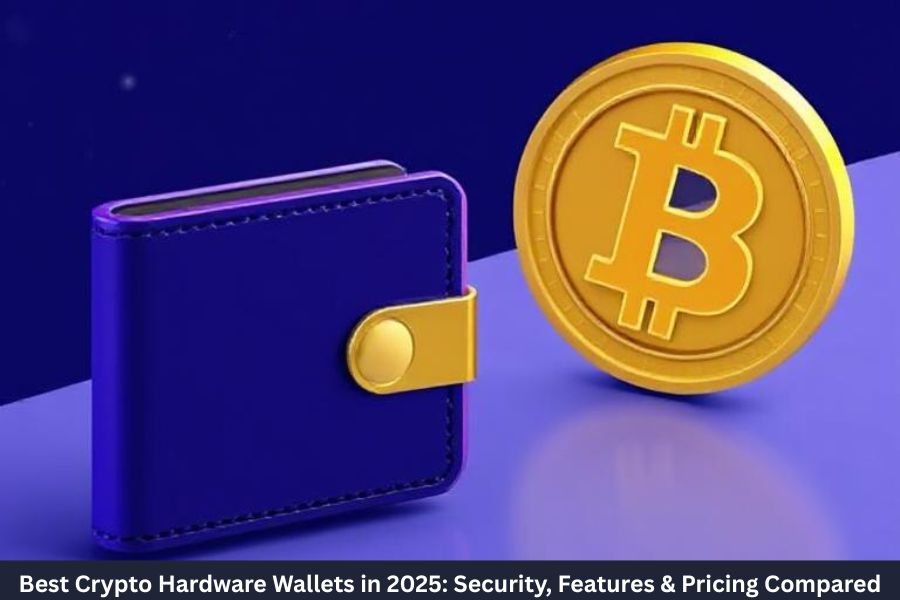In 2025, crypto is no more an investment avenue for techies, and hence it has gone mainstream. With governments working on the regulations, the influx of institutional money, increased user base for DeFi, the importance of crypto security has surged. But software wallets and exchanges still pose gateway vulnerabilities through hacking, malware, and phishing and plain human error.
So whatever serious amount of cryptocurrencies you have, go for the hardware wallet. These small devices take your private keys offline-out of reach of any bad actor. Consider them your digital safes that only you can open.
What Is a Hardware Wallet?
Simply put, a hardware wallet is a physical device that stores your private crypto keys in an offline environment. This way, it is almost impossible for hackers to get remote access to your funds. Unlike hot wallets such as MetaMask or Coinbase Wallet, a hardware wallet never exposes your private keys to the internet.
Every time a transaction is made, the device internally signs it and sends it to the blockchain. Your private keys? They never leave the wallet. Simple, secure, and smart.
Top 5 Crypto Hardware Wallets for 2025
There are quite a lot of options, but these five are our best picks for 2025 based on viability, security, functionality, and overall value:
Ledger Nano X (2025 Edition)
Ledger is still the king in the hardware wallet space with the Nano X, merging the style with bulletproof security. It also supports Bluetooth so you can manage your assets via your phone without plugging it in every time.
It supports over 5,500 coins and tokens, from Bitcoin to Ethereum, to NFTs and all the major DeFi assets. With Ledger Live, you can easily buy, swap, and stake crypto right from your device.
Price: Around $149
Best For: All-round users who want flexibility and trust
Trezor Model T
If you cherish transparency and open-source projects, it might be the Trezor Model T for you. Trezor’s software is open-source 100%, so developers can audit it at will. It has a splendid color touchscreen, which makes navigating much smoother compared to buttons.
It also supports the Shamir Backup, an advanced feature that allows you to recover your wallet in a much safer manner. Over 1,400 cryptocurrencies can be stored on Trezor, and the UI is extremely friendly for new users.
Price: $179 approximately.
Best for: Purists of security, concerned about privacy.
SafePal S1
SafePal S1 is the budget king in this list. Despite its low price it offers maximum protection as it remains fully air-gapped. That means no USB, no Wi-Fi, no Bluetooth; it communicates through QR codes and has a self-destruct mechanism that activates upon tampering detection.
The device supports over 10,000 tokens, including support for NFTs and multi-chain assets. You can manage everything through the SafePal mobile app.
Price: Around $49
Best For: Users With Budget Constraints Who Want True Offline Security
Keystone Pro (Formerly Cobo Vault)
It’s got the tank treatment before the actual namesake. One can sign in using biometrics with a rugged metal shell with a big touch screen for easy navigation and operation. It is fully air-gapped, signing transactions via QR codes without ever sacrificing a connection to any network.
It’s a little on the heavy side but fits very well into the lifestyles of those who deal with high portfolios and want institutional-level security.
$Price: Around $169
Best for High-net-worth investors and long-term cold storage
Ellipal Titan 2.0
The Ellipal Titan is a secret, air-gapped wallet, and it doesn’t joke about it. It is made from metal and resistant to physical interference. With its large screen and DeFi features, it supports 10,000+ assets, including NFTs and dApps.
It also refrains from using any physical connections (USBs, Bluetooth, etc.), which reduces the attack surface hugely. You will interact via QR codes, managing assets from the Ellipal app.
Price: Approximately $139
Best For: The most demanding physical security for a DeFi user
How to Choose Your Right Wallet
Choosing the best wallet comes down to your needs.
- Just starting out: The Ledger Nano X is great for beginners while super loaded.
- Want total control and privacy: Go with Trezor Model T with open source protection.
- In a budget: SafePal S1 gives you great security without excessive spending.
- Managing large holdings: Keystone Pro or Ellipal Titan will carry their weight.
Remember that your hardware wallet guarantees your financial sovereignty. Choose it wisely.
Conclusion: Securing Your Crypto Like a Pro
Crypto is moving fast — so are the threats. If you are storing coins on an exchange or a hot wallet, you are playing with fire. Whether you are guarding a few hundred bucks or a small fortune, a hardware wallet is one-time money well spent: it has the potential to save you thousands or even more.
Stop risking it! Protect your assets with the hardware wallet of your choice, and go to sleep with much less worry. Security is a matter of survival in the crypto world.
FAQs
1. Can I use a hardware wallet with my phone?
Yes! Most wallets nowadays, including Ledger or SafePal, will support mobile apps that communicate through either Bluetooth or QR code integration.
2. What happens if I lose my wallet?
As long as you retain your recovery phrase (usually about 12–24 words), you can restore your wallet onto a new device.
3. Are hardware wallets meant for beginners?
They absolutely are! Devices such as the Ledger Nano X and Trezor Model T have been designed with ease of use in mind.
4. Do hardware wallets support NFTs?
Yes, Ellipal, Ledger, and SafePal all allow NFT viewing and transfers through their wallets.
5. Is it worth paying over $100 for a hardware wallet?
It sure is worth it if your crypto holdings amount to more than just a few hundred dollars!




